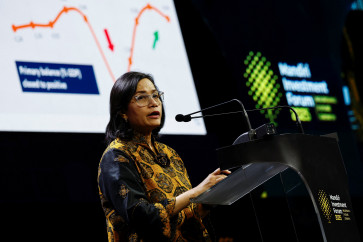Popular Reads
Top Results
Can't find what you're looking for?
View all search resultsPopular Reads
Top Results
Can't find what you're looking for?
View all search resultsThe need for a progressive policy to boost innovation
The government has just announced the establishment of 100 national science and technology parks
Change text size
Gift Premium Articles
to Anyone
T
he government has just announced the establishment of 100 national science and technology parks. Research and Technology and Higher Education Minister Muhammad Nasir has said that he hoped that the program could inspire the development of other science and technology programs.
But the administration of President Joko 'Jokowi' Widodo has failed so far to convince academic communities that its policy will boost research and innovation leading to economic growth.
Productivity of academic paper publishing by Indonesian scholars is still considerably low. According to scimagojr.com, from 1996 to 2013, Indonesian scholars published 25,481 papers internationally.
This is much lower rather than some ASEAN countries, such as Malaysia (125,084 papers), Singapore (171,037 papers) and Thailand (95,690 papers), although in the same period, our international collaborations were higher than that of those countries.
The Patent Treaty Cooperation international phase filing indicated that Indonesia only submitted 12 patent applications in 2012 (World Intellectual Property Organization, 2013). In ASEAN Indonesia sat in sixth place below Singapore (710 applications), Malaysia (292), Thailand (80), the Philippines (16) and Vietnam (13).
The government, through the National Mid-Term Development Plan (RPJMN) for 2015-2019, has identified some obstacles in developing research-intensive universities, mainly because: universities prefer to develop an academic program (rather than research) that is favored by the market; the lack of focus and desire to be a center of excellence in research; many academics have insufficient time to conduct research due to high teaching loads; and low research funding at only 0.08 percent of gross domestic product.
Despite such an acknowledgement, the government falls short of progressive solutions. So far, the Jokowi administration seems to continue the old policies, rather than boldly propose a transformational change to boost research and innovation.
Take the Business Innovation Center (BIC). Since its establishment in 2008 by the Research and Technology and Higher Education Ministry, the BIC has lacked medium and long-term visions and the institution still acts as an intermediary agency for academics, business entities and governmental organizations, rather than proactively bringing together researchers, innovators and businesses and equipping them with skills, knowledge, technical resources and financial capital.
Understandably, Jokowi faces many problems during the first semester of his administration. Those problems are then reflected in the 'blip' of the economic performance, but it does not mean that he can do nothing to bring about improvement.
In his keynote speech at the recent Cranfield Indonesian Scholars Community Research Workshop at Cranfield University, Satya Widya Yudha, deputy chairman of the House of Representatives Commission VII, advised the government to rekindle the relationship between innovation policy and economic growth. The present policy would certainly need revising to support economic growth.
There are some options that Jokowi could consider to improve the research and innovation culture in Indonesia.
First, he should issue the new policy framework regarding research and innovation. According to Mariana Mazzucato, a professor from the University of Sussex, this framework could guide policy making over investment, create markets and mitigate risks of uncertainty. Additionally, this framework should also combine social, economic, political and technological aspects.
Second, he should revise the BIC mission. This institution should be put at the center of innovation circles, as a key player to accelerate economic growth. This is essential to manage all activities over research and innovation. The BIC should then be able to create and shape the markets.
Third, Jokowi should start to exercise the possibility of raising funds from the private sector to support research and innovation. This is more or less what the Brazilian government has adopted. For instance, multinational corporations authorized for the independent production of, say, electricity are required to apply annually for an amount of at least 1 percent of net operating revenue in research and development of the electricity sector.
In the case of Indonesia, funds might also come from corporate social responsibility budgets. The government could give the authority to the BIC to manage the funds.
In other words, the BIC will play the roles of bridging, collecting, collaborating and empowering all stakeholders (academics, businesses and government).
The BIC should adopt and apply good governance principles, accountability and transparency.
The BIC must have a clear management structure, something that at present is not yet clearly stated, at least on its website.
Without any, or at least some, of the progressive actions mentioned above and the consistency in the government's actions to fix past failures, Indonesia will not move forward; we will remain as consumers of research and innovation rather than a key player.
__________________________
Anton Aliabbas works for Digimed, a digital media consulting company based in Jakarta, and is a PhD research student at the Centre for International Security and Resilience, Cranfield University, Shrivenham, the UK. Benny Tjahjono worked with global clients on industry funded projects and is a senior lecturer in supply chain operations at the Cranfield School of Management, Cranfield University, Bedford, the UK.










